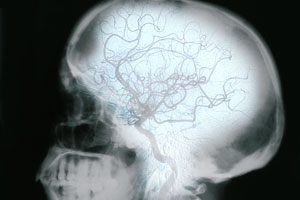AN Australian neurologist has criticised the early cessation of a US study that found aggressive medical management of patients with intracranial arterial stenosis was superior to medical treatment plus stenting.
Associate Professor Bernard Yan, a neurologist and neurointerventionist from the Melbourne Brain Centre at the Royal Melbourne Hospital, said that the premature closure of the trial meant that it provided limited data.
The US research, published in the New England Journal of Medicine, involved 451 patients with intracranial arterial stenosis who had experienced a transient ischaemic attack or stroke in the 30 days before enrolment. (1)
Patients were randomly assigned to receive either aggressive medical management or the same medical management plus percutaneous transluminal angioplasty and stenting (PTAS) using the Wingspan stent system.
The 30-day rate of stroke or death was 14.7% in the PTAS group and 5.8% in the medical management group.
“The rate of periprocedural stroke after PTAS was higher than expected and the rate of stroke in the medical management group was lower than estimated”, the researchers wrote.
Enrolment for the trial was stopped early because of concerns regarding the safety of PTAS and because futility analyses indicated that there was virtually no chance that a benefit from PTAS would be shown if enrolment continued.
Dr Yan said that by stopping the study early, “all you get is the impression that the intervention may have done harm, but we haven’t got the answer — the sample size is too small”.
“The problem is balancing patient safety against not recruiting patients, but I think the paper would have been better if [they] had bitten the bullet and continued with recruitment”, he said.
Dr Yan said the research also would have been stronger if the researchers had focused on patients with intracranial arterial stenosis who had already failed best medical therapy and had experienced recurrent strokes. At Dr Yan’s institution, it is these patients who are treated with the Wingspan stent system.
“[The paper has] confirmed our suspicion that you shouldn’t be putting intracranial stents into patients who have never tried best medical therapy, but the much more important question is what to do with those patients who have failed best medical therapy”, he said.
The aggressive medical management used in the study was 325 mg/day of aspirin, 75 mg/day of clopidogrel and a lifestyle modification program to manage risk factors, including targeting systolic blood pressure of less than 140 mmHg and low-density lipoprotein cholesterol of less than 70 mg/dL.
Of the 33 strokes that occurred in the PTAS group within 30 days of study enrolment, 25 occurred within 1 day after the procedure.
Dr Yan said the research needed to be considered in the context of rapid technological developments, which meant that newer PTAS devices were likely to be safer than the Wingspan device.
A related editorial in the NEJM said the study showed that aggressive and attentive medical therapy was an effective approach to the prevention of stroke in high-risk populations. (2)
The editorial said the study showed that intracranial revascularisation was more technically challenging than stenting of the extracranial carotid artery.
– Sophie McNamara
1. N Engl J Med 2011; 7 September (online)
2. N Engl J Med 2011; 7 September (online)
Posted 12 September 2011

 more_vert
more_vert
The authors can not be criticised for stopping the trial, because they demonstrated that they were (a) probably killing people using the study’s current inclusion criteria and (b) not going to show any benefit even with a big/change swing in numbers as the study progressed (futility analysis). We need to see this result for what it is and make sure we do not offer this futile treatment UNLESS it is done through a new trial that better targets the groups more likely to benefit, OR a newer device is developed and there are sound reasons for expecting it to provide a better outcome.